|
|
|
Sort Order |
|
|
|
Items / Page
|
|
|
|
|
|
|
| Srl | Item |
| 1 |
ID:
153611
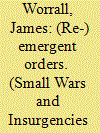

|
|
|
|
|
| Summary/Abstract |
The concept of order is often neglected in the study of conflict – seemingly such a ‘disordering’ process. With the recent increase in the examination of rebel governance however, bringing order back into our understanding of rebel and insurgent groups has much to offer in exploring the everyday politics which connect authorities, rebel movements and the population itself, in a complex mass of intersubjective and power-based interactions and negotiations. Rebels both shape and are shaped by existing forms of order in complex and ongoing ways. This article explores how varying elements interact in the negotiation, framing and enforcement of order and develops an original analytical framework to examine the perpetual negotiations of rebel movements in their attempts to cement their control.
|
|
|
|
|
|
|
|
|
|
|
|
|
|
|
|
| 2 |
ID:
153617
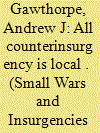

|
|
|
|
|
| Summary/Abstract |
Although the concept of legitimacy is central to Western counterinsurgency theory, most discourse in this area black-boxes the concept. It hence remains under-specified in many discussions of counterinsurgency. Fortunately, recent research on rebel governance and legitimacy contributes to our understanding of the problems faced by counterinsurgents who want to boost state legitimacy while undermining that of the rebels. Taken together, this research illustrates that a rational choice approach to legitimacy is simplistic; that micro-level factors ultimately drive legitimacy dynamics; and that both cooption of existing legitimate local elites and their replacement from the top–down is unlikely to succeed. Western counterinsurgency doctrine has failed to grasp the difficulties this poses for it.
|
|
|
|
|
|
|
|
|
|
|
|
|
|
|
|
| 3 |
ID:
153612
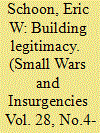

|
|
|
|
|
| Summary/Abstract |
Previous research has identified a variety of general mechanisms to explain how insurgents build legitimacy. Yet, there is often a gap between these mechanisms and the interactional dynamics of insurgencies. This article attempts to bridge this gap through a theoretically informed analysis of the Kurdistan Workers’ Party’s (PKK) insurgency in Turkey. I show how the PKK’s efforts to cultivate legitimacy, Turkey’s counterinsurgency strategies, and civilian perceptions of the PKK, all mutually influenced one another. Based on this analysis, I argue that the mechanisms that produce popular legitimacy coevolve with insurgents’ behaviors, states’ interventions, and civilians’ perceptions.
|
|
|
|
|
|
|
|
|
|
|
|
|
|
|
|
| 4 |
ID:
153613
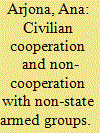

|
|
|
|
|
| Summary/Abstract |
Terms like ‘support’ and ‘collaboration’ are often used interchangeably to denote a loose set of acts or attitudes that benefit non-state armed groups (NSAGs). However, these terms are seldom defined, and the alternatives available to civilians are rarely identified. Moreover, existing approaches overlook that the interaction between civilians and NSAGs is often one between ruler and ruled, which makes obedience and resistance central. This paper proposes to conceptualize the choices available to civilians as forms of cooperation and non-cooperation, offers a typology, and discusses the implications for theory building on civilian and NSAG behavior, and on the functioning of armed social orders.
|
|
|
|
|
|
|
|
|
|
|
|
|
|
|
|
| 5 |
ID:
153619
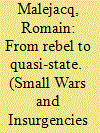

|
|
|
|
|
| Summary/Abstract |
How do warlords build their legitimacy and eventually exert authority? The case of Afghan leader Ahmad Shah Massoud demonstrates that warlords do not only build legitimacy through the internal provision of goods and services to the population under their control, but also build their legitimacy by projecting authority externally, through the development of their own form of diplomacy. In this article, I show that warlords develop complex and complementary legitimisation strategies that extend beyond their territorial realms to include consequential relationships with foreign actors.
|
|
|
|
|
|
|
|
|
|
|
|
|
|
|
|
| 6 |
ID:
153616
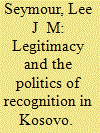

|
|
|
|
|
| Summary/Abstract |
How do contemporary secessionist movements gain international recognition of their claims to self-determination? I argue that international recognition is forthcoming when a sufficient number of states believe a claim to self-determination ought to be accepted. That is, states recognize claims to self-determination when they perceive them to be legitimate. To convince outsiders of the legitimacy of their claims, separatist movements invoke resonant norms and symbols in a moral economy that structures decision-making. I contrast this argument with prevailing explanations of recognition dynamics. To illustrate the argument, I examine the diplomacy surrounding Kosovo’s independence bid and unilateral secession.
|
|
|
|
|
|
|
|
|
|
|
|
|
|
|
|
| 7 |
ID:
153618
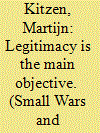

|
|
|
|
|
| Summary/Abstract |
This article seeks to contribute to the understanding of the role of legitimacy and different forms of legitimation in population-centric counterinsurgency. An analysis of the logic underlying this counterinsurgency concept sheds a light on the former as it identifies legitimacy as the crucial mechanism through which a collaboration strategy seeks to obtain control over the local population. An exploration of Weber’s primary types of legitimate authorities provides the insight that counterinsurgents might operationalize legitimation through either rational-legal ways or by co-opting local power-holders who hold a position as traditional or charismatic leaders. The exact choice of strategy depends on the pattern of legitimacy in the target society and therefore so-called cultural legitimation is pivotal.
|
|
|
|
|
|
|
|
|
|
|
|
|
|
|
|
| 8 |
ID:
153615
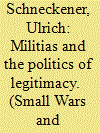

|
|
|
|
|
| Summary/Abstract |
Militias and rebels depart from different angles when it comes to the politics of legitimacy. While rebels have to address the issue of legitimacy early on in order to gain popular support, militias can rely on some kind of ‘borrowed legitimacy’. Based on this observation, the paper introduces militias as special form of organised violence visible in many civil wars and fragile states as well as elaborates on the politics of legitimacy typical for militias. By distinguishing different forms of militia violence (counter-insurgency, counter-rival and counter-crime), the articles shows how militias respond to major challenges in legitimizing violent actions.
|
|
|
|
|
|
|
|
|
|
|
|
|
|
|
|
| 9 |
ID:
153609
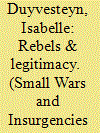

|
|
|
|
|
| Summary/Abstract |
This introduction to the double special issue on the theme of rebels and legitimacy aims to set out the parameters for the discussion. It looks at legitimacy as a concept and at legitimation as a process. To date most of the literature on legitimacy has focused on the state. However, rebel groups such as insurgents, terrorists, warlords and guerrillas have all had claims, and continue to claim, legitimacy as well. How and when are these rebels seen as legitimate actors? Existing suggestions of rebel legitimacy focus heavily on state models of social order and the social contract. This first contribution discusses how to conceptualize legitimacy and how to make it operational. A two-pronged approach, borrowing heavily from Max Weber, is proposed. Legitimacy is investigated based on beliefs and belief systems about what is considered legitimate. This is combined with practices whereby legitimacy is enacted, copied and emulated by the population the rebels claim to represent.
|
|
|
|
|
|
|
|
|
|
|
|
|
|
|
|
| 10 |
ID:
153620


|
|
|
|
|
| Summary/Abstract |
Contemporary development assistance often takes the form of subcontracted state-building. Foreign donors hire for-profit firms to provide services and to improve or create institutions in developing countries, particularly those experiencing internal conflict. This arrangement creates two counterproductive dynamics: first, it introduces agency problems between donors, recipient states, subcontractors, and citizens; and second, it undermines the long-run development of domestic bureaucratic capacity by creating disincentives for the host government to invest. These dynamics hinder, rather than foster, the legitimacy of state institutions. This paper summarizes trends in external support to state-building since the 1970s and illustrates subcontracted state-building with examples from Colombia.
|
|
|
|
|
|
|
|
|
|
|
|
|
|
|
|
| 11 |
ID:
153610
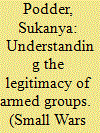

|
|
|
|
|
| Summary/Abstract |
This paper analyses the multiple pathways through which legitimacy of armed groups is constructed in conflict-affected states. It adopts a political sociological approach to the study of armed group legitimacy. Such a strategy assists in identifying whether armed groups enjoy legitimacy in a given empirical context and avoids applying pre-determined normative criteria. The focus is on three types of relationships: civilian communities, the state or regime in power and external actors including regional and international sponsors, to discern which types of legitimacy matter for armed groups in different relationships.
|
|
|
|
|
|
|
|
|
|
|
|
|
|
|
|
| 12 |
ID:
153614
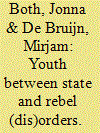

|
|
|
|
|
| Summary/Abstract |
The Sahel has gained attention in international politics as one of the central theatres in the war on terrorism. International actors in this war seek alliances with states in the region, reinforcing the latter’s military strength and their legitimacy from outside. At the same time, increasingly-connected young populations question the legitimacy of their states, and contest that legitimacy from within and below. In the absence of states delivering any reasonable form of social contract, young people become torn between different governing orders and find themselves in a liminal space. In this article we present the cases of youth in Mali and Chad, who find themselves in a period of re-definition of their position in society and hence search for legitimate structures representation. In this search they may frame their belonging in terms of ethnicity, religion or political opposition – and increasingly also in adherence to global citizenship. New information flows and connectivity among young people in these regions, and between them and the diaspora, has given a new turn to their search for citizenship/belonging and rightful representation. However, whether their search will be successful in this geopolitical context is questionable.
|
|
|
|
|
|
|
|
|
|
|
|
|
|
|
|
|
|
|
|
|